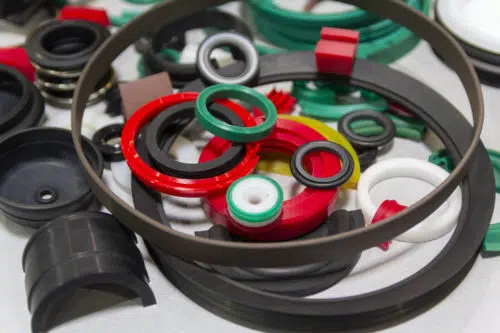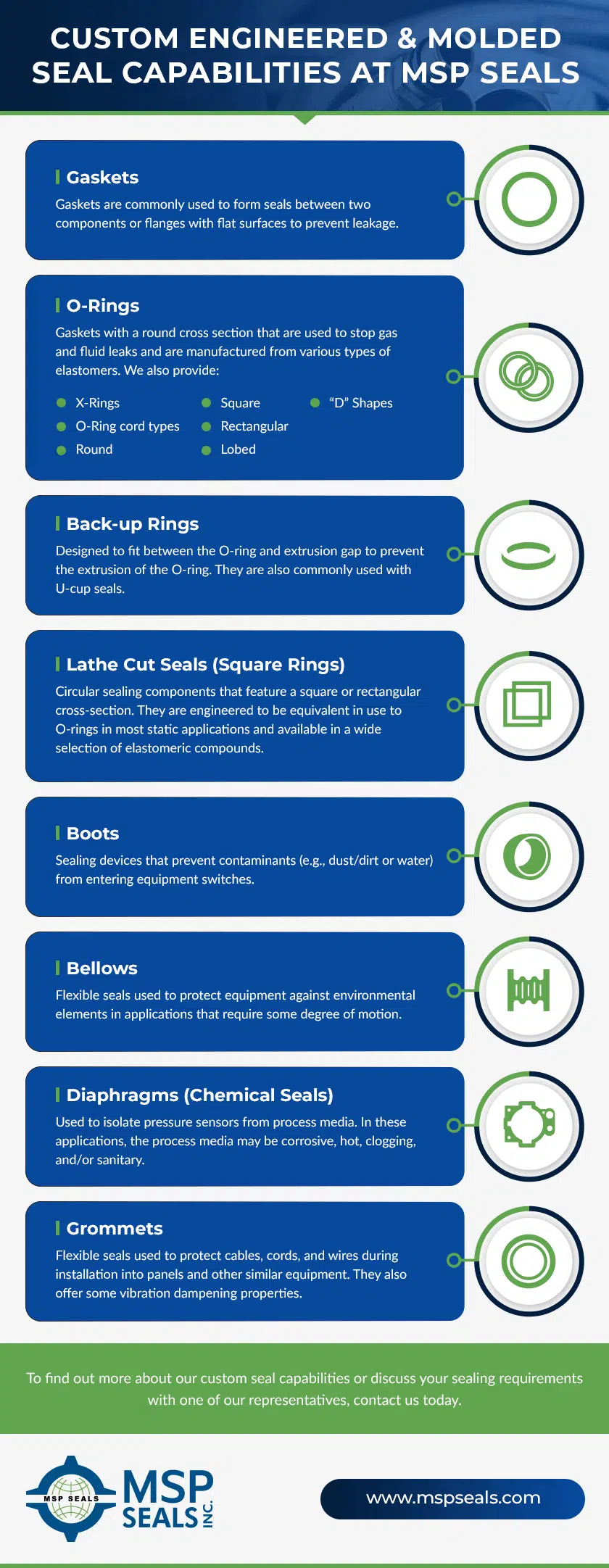Founded in 1998 in Indianapolis, Indiana, MSP Seals has since developed a reputation as a premier supplier of engineered seal products for countless industries across the globe. In addition to our standard seal offerings, we provide custom seals, custom-molded gaskets, custom bellows, custom grommets, and custom diaphragms for highly specific or unique applications.
While standard engineered seal products are available in various materials and sizes, an off-the-shelf sealing solution may not always fully meet the application’s needs. Custom seals are tailored to the application’s requirements and restrictions, ensuring they offer the exact—rather than approximate—performance characteristics required.
How Are Custom Seals Made?
There are three main means of producing custom seals:
- Injection molding — Injection molding is the most cost-effective production method for custom seals. It is excellent for producing small products with tight tolerances and low finishing requirements in high volumes. The process involves heating the molding material and injecting it into a mold. As pressure, temperature, and speed conditions are highly controlled, manufacturers can achieve extremely precise production operations.
- Compression molding — Unlike injection molding, compression molding is better suited for producing large parts that do not require tight tolerances or perfect finishes in small to medium production volumes. The process involves preheating and inserting the molding material into a compression mold. Some of the advantages of this method include fewer knit lines, faster production, lower tooling costs, and better accommodation of high-durometer materials.
- Transfer molding — Similar to compression molding, transfer molding utilizes presses and molds. The main difference is that it uses a piston mechanism to force the molding material into an enclosed—rather than an open—mold. This method is suitable for producing larger parts or highly complex parts with tight tolerances in high production volumes. Its primary disadvantage is its high production costs.
Since each molding method carries its own advantages and disadvantages, seal manufacturers must consider which one best suits their part and production specifications.
Custom Engineered & Molded Seal Capabilities at MSP Seals
At MSP Seals, we offer a variety of custom seals and engineered seal products, including:
- Gaskets — Gaskets commonly form seals between two components or flanges with flat surfaces to prevent leakage.
- O-Rings — O-rings are gaskets with a round cross-section used to stop gas and fluid leaks and manufactured from various elastomers. MSP Seals provides custom O-rings of special shapes and coatings, including:
- X-Rings
- O-Ring cord types
- Round
- Square
- Rectangular
- Lobed
- “D” Shapes
- Back-up rings — Back-up rings are designed to fit between the O-ring and the extrusion gap to prevent the extrusion of the O-ring. One or two backup rings may be used per O-ring, depending on the direction of pressure in the sealing application. They are also commonly used with U-cup seals.
- Lathe cut seals — Also called square rings, these are circular sealing components that feature a square or rectangular cross-section. They are engineered to be equivalent to O-rings in most static applications and available in a wide selection of elastomeric compounds.
- Boots — Boots are sealing devices that prevent contaminants (e.g., dust/dirt or water) from entering equipment switches.
- Bellows — Bellows are flexible seals used to protect equipment against environmental elements in applications that require some degree of motion.
- Diaphragms — Our custom diaphragm seals, also called chemical seals, isolate pressure sensors from process media. In these applications, the process media may be corrosive, hot, clogging, and/or sanitary.
- Grommets — Our custom grommets are flexible seals used to protect cables, cords, and wires during installation into panels and other similar equipment. They also offer some vibration-dampening properties.
- Miscellaneous Products — Molded seals and products can dampen, isolate, and space components in applications.
These custom seals are available in single pieces to high-volume production quantities. We also offer a variety of material options to suit different application requirements, including, but not limited to, the following:
- Elastomers
- Nitrile Butadiene Rubber (NBR, Buna-N)
- Fluorocarbon (V, FKM, FPM, FFKM, FFPM)
- EPDM (EP)
- Fluorosilicone
- Silicone (SI)
- Neoprene / Chloroprene (CR)
- Polyacrylate (ACM)
- Polyurethane Rubber (AU, EU)
- Metallic
- Brass
- Bronze
- Stainless Steel (304, 316, 316L, etc.)
- Other
- PTFE
- Nylon
- Carbon
- Ceramic
Contact the Custom Seal Experts at MSP Seals Today
Custom seals help ensure your equipment and systems operate exactly as you expect. If you need a custom sealing solution for your facility, the experts at MSP Seals are here to help.
At MSP Seals, we’ve provided standard and custom seals for over 25 years. This experience, combined with our design and engineering capabilities and broad material inventory, help us develop and deliver a sealing solution that fully meets your needs. We offer engineering assistance, as well as, inventory management programs, packaging and labeling, custom kits, total cost management, and full PPAP capabilities. MSP Seals is currently ISO 9001:2015 certified and ISO 14001:2015 certified.
Contact us today to learn more about our engineered seal products and custom seal capabilities, or discuss your sealing requirements with one of our representatives.


